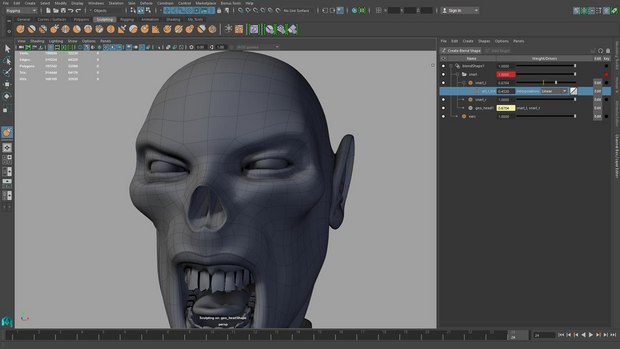Autodesk launches Stingray Game Engine v1.2 and Maya LT 2016 Extension 3 with feature improvements at GDC 2016.
 SAN FRANCISCO -- Looking to the future of game development, Autodesk is advancing its toolset for indie game makers with innovative updates to its Stingray Game Engine and Maya LT 2016 3D animation and modeling software.
SAN FRANCISCO -- Looking to the future of game development, Autodesk is advancing its toolset for indie game makers with innovative updates to its Stingray Game Engine and Maya LT 2016 3D animation and modeling software.
Unveiled this week at the 2016 Game Developers Conference, Stingray v1.2 adds support for new VR platforms and improvements that speed up common tasks within the engine. Maya LT Extension 3, coupled with Stingray v1.2, integrates several modeling, UV creation, rigging and animation improvements, and includes an updated exporter to simplify the creation of visually compelling characters.
Stingray v1.2 Highlights:
- Expanded VR Support: Compatibility with the HTC Vive VR Platform and Oculus Rift SDK v0.8.
- Multi-core Compilation: Faster project and asset import with multi-CPU compiling.
- Workflow Improvements: Entity support in story enables the shading environment to be animated with global illumination, fog, depth of field and more; a unit component editing tool moves, rotates or scales and animates sub-components of units; improved UI flexibility helps snap, move, or maximize/minimize Stingray tools independently of each other and use multiple monitors in development; and rendered outline highlights make it easier to find lost objects within large scenes.
Maya LT 2016 Extension 3 Highlights:
- Rigging Advances: New quick rig tool allows for the automated creation and placement of bipedal character rigs, while HumanIK support for up to five roll bones per limbs distributes model deformations during an animation.
- Improved Modeling and UV Toolsets: New shape authoring toolset and shape editor as well as blendshape deformer and sculpting enhancements; a robust mesh mirroring command and expanded tool symmetry; a new brush-based Symmetrize UV Tool, multi-object support for Unfold and improved layout and auto-seam features; and poly modeling enhancements.
- Updated Game Exporter: Users can now select objects in the viewport, create a named set with a single click and view it in the game exporter as an object to be exported; click-drag workflow facilitates scrolling through key frames in animations to choose the clip’s start and end times.
“We chose Maya LT because it is affordable and has pretty much everything we need for asset creation -- modeling/texture baking -- we love Turtle!” Compulsion Games COO Sam Abbott shared recently. “Subscribing to Maya LT allows us to equip a growing team more easily and always have the most up-to-date tools available. And, Maya LT is probably the best quality for cost software in the industry right now, and we’re really happy using it.”






 Throughout GDC, Autodesk will also host a series of sessions spotlighting developers such as Eidos-Montreal and Fatshark, and present Stingray technology demos, including a session on building VR experiences. Scheduled sessions include:
Throughout GDC, Autodesk will also host a series of sessions spotlighting developers such as Eidos-Montreal and Fatshark, and present Stingray technology demos, including a session on building VR experiences. Scheduled sessions include:
Wednesday, March 16
- 12:30-1:30pm PT -- Eidos-Montreal’s Narrative Driven Experiences (West Hall Rm. 2014)
- 3:30-4:30pm PT -- Technical Intro to Autodesk’s Stingray Game Engine (West Hall Rm. 3022)
Thursday, March 17
- 11:30am-12:30pm PT -- Post Mortem: “Warhammer: The End Times -- Vermintide” (West Hall Rm. 2014)
- 4:00-5:00pm PT -- Building VR Experiences in the Autodesk Stingray Game Engine (West Hall Rm 3022)
Stingray v1.2 is available for subscription customers to download starting March 15, 2016 and runs $30 US MSRP per month. Maya LT 2016 Extension 3 will be available for download to customers on subscription April 18, 2016, and includes access to Stingray v1.2 in the monthly subscription fee.
Source: Autodesk












